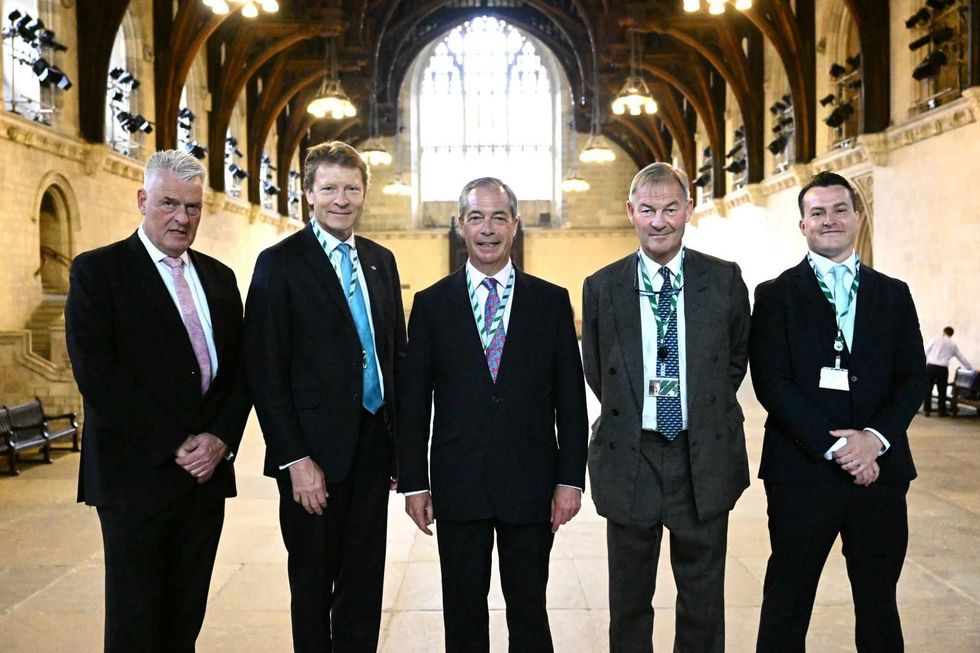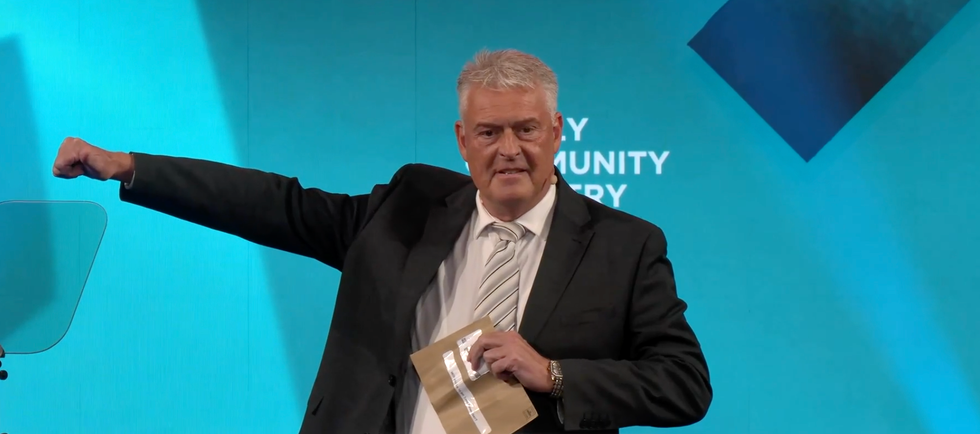Adam Chapman
Guest Reporter
Reform UK could be a formidable force going into the next General Election if they form a "blocking minority" in the Welsh and Scottish Parliamentary elections in 2026, claims Britain's favourite elections guru.
Sir John Curtice's prediction comes after millions of people signed a petition to call an early General Election in protest over Sir Keir Starmer’s premiership. MPs will debate the online petition calling for a re-run of July's general election on January 6.
Reform UK will be eyeing an opportunity: it came second to Labour in 89 seats at the General Election.
The insurgent party will be praying one of the Labour MPs it came second to unexpectedly leaves the House of Commons in the next 18 months or so, Professor Sir John Curtice tells GB News.
Likewise, if Reform puts up a "decent slate of candidates" in the local elections in May next year, they could profit from the fact that the Conservatives are defending a "very high baseline", he tells GB News.

However, the real gains for Reform are expected to come across the border, according to the political scientist.
Polling shows Labour is haemorrhaging support in Scotland with Reform being one of the main beneficiaries.
Labour’s vote share north of the border has crashed from 30 to 23 per cent amid Starmer's chaotic premiership.
This will be music to Reform's ears, which is now “well above the threshold needed to win seats at the Holyrood election in 2026”, Curtice says.
Nigel Farage's party could unexpectedly secure over ten seats in the Scottish Parliament, he predicts.
As Curtice explains, this fragmentation could make it challenging for any clear coalition to form, either among pro-independence parties like the SNP and Greens, or among unionist parties such as Labour, the Conservatives, and the Liberal Democrats.
"This would potentially constitute a blocking minority," he told GB News.
A separate poll by Norstat suggests that Reform could potentially win up to nine MSPs.
This would likely come at the expense of the Conservative Party, indicating a shift in voter preference towards Reform UK in Scotland.
LATEST DEVELOPMENTS

A similar story is playing out in Wales with Reform surging at Labour’s expense. The latest analysis shows Reform could become the third biggest party in Senedd (Wales' Parliament), increasing their members from zero to 17.
A separate poll conducted by Survation for ITV News Wales indicated that if the Senedd election were held in November 2024, Reform UK would be the third most popular party in Wales, with 20 per cent of the vote for constituency representatives, ahead of the Conservatives.
This could translate into a significant number of seats under the new proportional representation system for the Senedd elections in 2026.
Both Holyrood and the Senedd use a form of proportional representation. Holyrood uses the Additional Member System (AMS), where voters have two votes: one for a constituency MSP and another for a regional list.
The Senedd will move to a system with more members and a more proportional representation from 2026.
These systems can be advantageous for smaller parties like Reform UK, allowing them to gain representation disproportionate to their overall vote share if they manage to secure enough votes in the right regions or constituencies.
For Reform to reach critical mass going into 2029, it will have to "succeed in creating a party organisation across the country because that's what they don't [currently] have", Curtice tells GB News.
As he points out, it's what UKIP - Farage's former party - never managed to achieve.
"It remains to be seen whether Reform UK can embed itself in the social and organisational life of the country," he added.
Find Out More...
Sir John Curtice's prediction comes after millions of people signed a petition to call an early General Election in protest over Sir Keir Starmer’s premiership. MPs will debate the online petition calling for a re-run of July's general election on January 6.
Reform UK will be eyeing an opportunity: it came second to Labour in 89 seats at the General Election.
The insurgent party will be praying one of the Labour MPs it came second to unexpectedly leaves the House of Commons in the next 18 months or so, Professor Sir John Curtice tells GB News.
Likewise, if Reform puts up a "decent slate of candidates" in the local elections in May next year, they could profit from the fact that the Conservatives are defending a "very high baseline", he tells GB News.

However, the real gains for Reform are expected to come across the border, according to the political scientist.
Polling shows Labour is haemorrhaging support in Scotland with Reform being one of the main beneficiaries.
Labour’s vote share north of the border has crashed from 30 to 23 per cent amid Starmer's chaotic premiership.
This will be music to Reform's ears, which is now “well above the threshold needed to win seats at the Holyrood election in 2026”, Curtice says.
Nigel Farage's party could unexpectedly secure over ten seats in the Scottish Parliament, he predicts.
As Curtice explains, this fragmentation could make it challenging for any clear coalition to form, either among pro-independence parties like the SNP and Greens, or among unionist parties such as Labour, the Conservatives, and the Liberal Democrats.
"This would potentially constitute a blocking minority," he told GB News.
A separate poll by Norstat suggests that Reform could potentially win up to nine MSPs.
This would likely come at the expense of the Conservative Party, indicating a shift in voter preference towards Reform UK in Scotland.
LATEST DEVELOPMENTS
- EXCLUSIVE: Putin 'close to victory' on the battlefield warns ex-RAF Chief
- MAPPED: Marginal Labour seats with most election petition signatures revealed as PM faces bloodbath
- GB News viewer perfectly sums up why the channel is NOT the BBC in a brilliant five-point summary

A similar story is playing out in Wales with Reform surging at Labour’s expense. The latest analysis shows Reform could become the third biggest party in Senedd (Wales' Parliament), increasing their members from zero to 17.
A separate poll conducted by Survation for ITV News Wales indicated that if the Senedd election were held in November 2024, Reform UK would be the third most popular party in Wales, with 20 per cent of the vote for constituency representatives, ahead of the Conservatives.
This could translate into a significant number of seats under the new proportional representation system for the Senedd elections in 2026.
Both Holyrood and the Senedd use a form of proportional representation. Holyrood uses the Additional Member System (AMS), where voters have two votes: one for a constituency MSP and another for a regional list.
The Senedd will move to a system with more members and a more proportional representation from 2026.
These systems can be advantageous for smaller parties like Reform UK, allowing them to gain representation disproportionate to their overall vote share if they manage to secure enough votes in the right regions or constituencies.
For Reform to reach critical mass going into 2029, it will have to "succeed in creating a party organisation across the country because that's what they don't [currently] have", Curtice tells GB News.
As he points out, it's what UKIP - Farage's former party - never managed to achieve.
"It remains to be seen whether Reform UK can embed itself in the social and organisational life of the country," he added.
Find Out More...